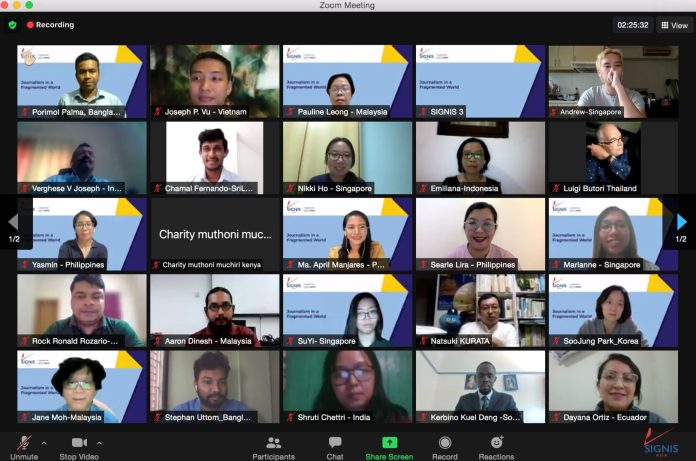Setting the tone for the first webinar of the seven-week program this week, SIGNIS World president Helen Osman addressed issues confronting journalists today.
Speaking from experience as someone who has built a career in Catholic media and organizations, she acknowledged her own struggle to remain balanced and unbiased while trying to abide by the standards and ethics of journalism.
“We must also realize that we consider those standards and ethics through the framework of our own values and belief perspectives,” she said.
“Does that make us biased? Or honest in our supposed objectivity?”
Asserting her belief that being more self-aware makes a better journalist, she went on to address the issues of impartiality, propaganda, fake news and balanced reporting, and how these are changing in an already disrupted world.
The dynamism of media and its myriad of channels are creating an increasingly complex environment for journalists and journalism today.
“A conversation is beginning…in a fragmented world, how relevant is impartial and objective journalism to audiences today?” she remarked.
“This is a challenge specific to journalists who work in both Catholic and secular media.”
She spoke also of the need to “speak truth to power” and opined that how journalists navigate today’s divisiveness and fragmentation will be likely to determine their effectiveness and impact, both as journalists and citizens.
Quoting a recent Reuters report that pointed out public expectations of journalists showing greater empathy and connection now, compared to previous levels, she suggested that there was a possible opening here for those wishing to offer a new perspective of truth, and explaining it to others.
Urging participants to always uphold the common good, she said, “Polarization and fragmentation happen because we harden ourselves into self-focused individuals, intent upon protecting our own.”
“We create a fragmented world where there are a few ‘winners’ and everyone else loses out.” In closing, she emphasized the importance of networking.
“We can only do things if we are part of a network of like-minded journalists,” she concluded. “All we have is our own integrity. It’s the only way you’re going to help people understand the truth.”
SIGNIS Asia Journalism Desk, in collaboration with LICAS News Asia, are the organizers of the inaugural SIGNIS Asia Journalism Fellowship Programme on the theme “Journalism in a Fragmented World,” a seven-week programme for lay Catholic and like-minded journalists working in the secular media.
Offered virtually, the seven-week webinar brings together 25 selected participants from 14 countries to build capacity and promote exchange among media professionals and journalists who want to use their platform for social change.









